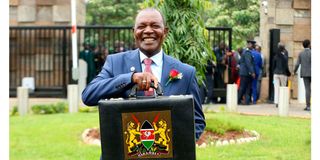How budget deficits escalate the cost of living

National Treasury Cabinet Secretary Njuguna Ndung’u at Parliament Buildings for the reading of the 2023/24 Budget Statement on June 15, 2023.
Deficit deniers would like us to believe that budget deficits are always a good and necessary thing. That deficits give the nation an opportunity to make rapid progress, particularly with limited resources. They point to a concept made popular in the 1980s corporate America, and widely taught in business schools. Leverage.
But as most businesspeople know intuitively, there is a point at which you become over-leveraged. The debt becomes too heavy for the business to carry. That inflection point is a moving target, but if more than 25 per cent of your revenues are going towards debt service you are at the beginning of trouble.
Nakumatt, Uchumi and Tuskys were in part brought down by heavy debt. Greece suffered a debt crisis from 2009 onwards. Even after negotiating a 50 per cent reduction in debt owed to private banks, it defaulted on an IFM loan in 2015. As the crisis unfolded, it emerged that the Greek government had been underreporting on the debt and deficit levels. Similar accusations of underreporting are swirling around in Kenya today. Seven months ago, Ghana defaulted on its external debt.
The current regime likes to compare itself with the Kibaki administration. And well they should. Here is a historical fact. In his first three years, Kibaki maintained a balanced budget, achieving a budget surplus in 2004. In common parlance, folks said Kibaki was financing his budget without donors.
Western diplomats and those of us in the World Bank Group at that time found ourselves in unfamiliar ground. Never one to talk too much, Kibaki never told us off. Rather he went about his business of running the country quietly, not ruffled by the politics of the incredibly high expectations of instant change. But there were no “big” donor programmes, the government was not running around begging, and the President had little time for photo-ops. Instead, he extolled the virtues of a working nation.
Begging category
Governments finance their budgets from taxes, and by borrowing. Poor nations also go begging from donors. In the 90s, Kenya was in the begging category, unable to meet even recurrent expenditure from tax revenue.
Escalation in the cost of living – what economists call inflation – means that your shilling buys less this year than last year. When your income increases more than inflation, then you are better off, because you can buy more this year. This comparison of what your shilling can buy from year to year is what we call real income. Real incomes increased fourfold in the Kibaki years!
Politicians may tell you different, but the size of the budget is a choice. When any administration decides to increase it, they must tax more, or borrow more, or both. If the government limits their spending appetite to the amount they are collecting in taxes, then you have a balanced budget. If government collects more than it spends in that year, well, you have a surplus. If government insists on spending more that it collects in taxes, then you have a deficit, and they have to borrow to cover it.
The preferred way of getting more taxes is to get more citizens to pay – widening the tax base. Still, even this route has its limits. For instance, it would be absurd to tax minors, or the very poor, all in the name of widening to taxable base.
The less preferred, more punitive route to more tax revenue is squeezing more from those who are already paying. This route is replete with problems. Taxes are a cost to the business. The natural step is for businesses to seek to pass on the cost to their consumers. When that happens, the prices of goods and services go up. The cost of living escalates.
Borrowing domestically has two effects. First, to attract more money, government has to offer high interest rates. Since government is seen as the best risk in any economy, all other interest rates are higher than what government is paying. Currently, Kenya government is paying 16 per cent interest for the seven-year, tax-free infrastructure bond. This is the equivalent of 22 per cent on a taxable basis. That means the interest rate that you and your small business will pay will be closer to 30 per cent.
Financing costs also have to be recovered from the selling price of goods and services. So as the interest rates rise, the prices of goods must rise. The cost of living escalates.
Repeal Finance Act 2023
In the ongoing national crisis, the Azimio coalition, Catholic Bishops and many others have called for the repeal of the Finance Act 2023. I would urge them to go further. What the country needs is to repeal the Finance Act, and to have a balanced government budget. Without these two steps, there is no hope of bringing down the cost of living.
Deficit deniers will argue that the nation cannot finance development without borrowing. So a realistic compromise could be a balanced budget not for all time, but for the medium term. We could amend the law so that, for instance, no government is allowed to borrow for all the five years that they are in office.
On a related note, some politicians are misleading the nation that government business will come to a standstill because of the suspension of the Finance Act 2023. Completely false. The annual Finance Act amends existing taxation laws, usually to increase existing taxes. What is affected, therefore, is the incremental taxation for that year. The existing tax laws such as the VAT Act, Income Tax Act, External Common Tariff, Miscellaneous Fees and Levies Act, all remain in place.
@NdirituMuriithi is an economist





